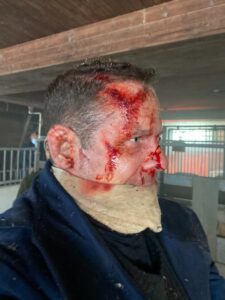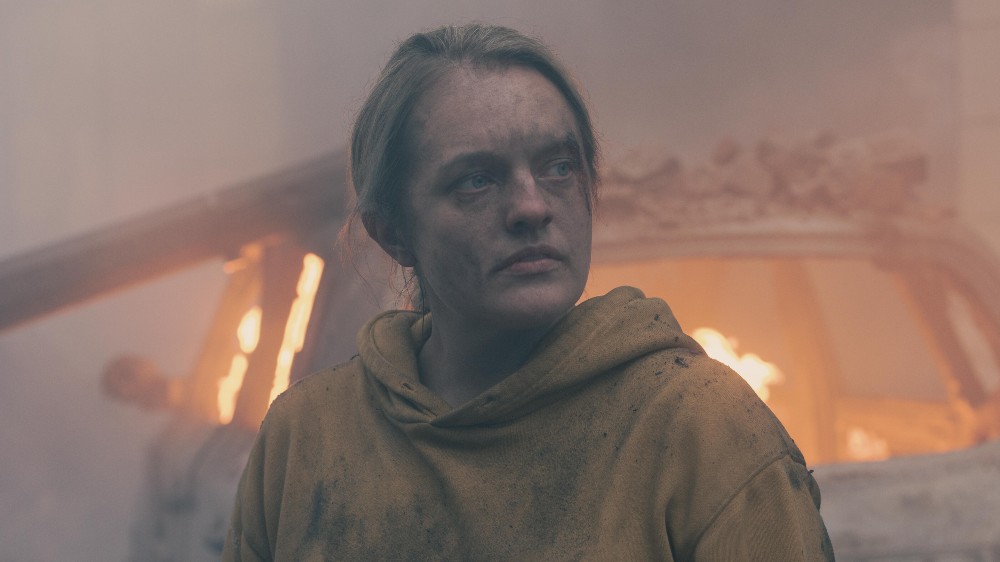
Burton LeBlanc makes Elisabeth Moss look like hell. And for his efforts, he’s earned three Emmy nominations. LeBlanc, you see, is a top TV and movie makeup artist and just landed his third nomination (shared with Alastair Muir) in the Outstanding Contemporary Makeup (Non-Prosthetic) category for his work on Hulu’s hit series, The Handmaid’s Tale. His TV and film credits date back to 1999 and include Twice in a Lifetime, Witchblade, The Incredible Hulk, Warehouse 13, American Gothic, and the Moss big-screen horror-thriller, The Invisible Man.
Below the Line recently caught up with LeBlanc, who detailed how he entered the business, discussed his unique bond with Moss, addressed the challenges of his work being seen in HD, and joked about the frequency of the phrases “Praise be” and “Blessed be the fruit” being uttered on the show’s set.

Below the Line: Congratulations on your latest Emmy nomination. First, what does it mean to you to be nominated? And second, how hopeful are you that the third time will be the charm?
Burton LeBlanc: It’s an honor to be recognized by my peers. I’ve put my heart and soul into this season and it’s definitely had some challenges, especially with the interruption of COVID, but the work is what came through in the end. For me, it’s always about doing amazing work and being proud of that, and hoping that the viewers respond in a positive way.
BTL: Before we speak specifically about The Handmaid’s Tale, go back to the start of your career. Why did you want to pursue the makeup end of the business? And how did you break into it?
LeBlanc: As a young boy I was always intrigued by what I saw on screen in terms of an actor changing their appearance for a character, the subtle differences or sometimes not-so-subtle way in which they looked by way of their makeup artists. It always fascinated me. I started taking after-school art classes, which developed my artistic abilities. I started researching makeup schools in North America and enrolled at Joe Blasco in Orlando, Florida.
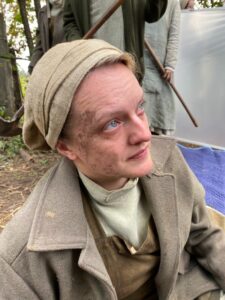 BTL: Which of your earliest jobs do you feel you learned the most from, and who in the makeup field did you learn the most from, either directly as a mentor, or just from watching him or her in the makeup trailer or on set?
BTL: Which of your earliest jobs do you feel you learned the most from, and who in the makeup field did you learn the most from, either directly as a mentor, or just from watching him or her in the makeup trailer or on set?
LeBlanc: The film My Big Fat Greek Wedding stands out for me in that it was one of my earlier jobs with a variety of real characters, and getting all of those characters looking the way they were supposed to look according to the script. My head of department on that film and mentor, Ann Brodie, taught me not only a great deal about makeup, but a lot about the film business as well, and maintaining a great sense of humor.
BTL: In general, what’s your philosophy when it comes to makeup for TV and movies? Is makeup, in some ways, a character unto itself, or is it meant to complement what a performer is doing?
LeBlanc: The key is to really study the character and do your research. When I first read a script, I have an idea of what the characters should look like, and pay a lot of attention to their backstory and where their story takes them. The makeup is meant to complement the performers and reflect that.
BTL: You’ve been with The Handmaid’s Tale since day one. Elisabeth Moss personally selected you. What were your initial conversations with her like – and did she ever tell you why she chose you?
LeBlanc: To be with Handmaid’s from the very beginning has been an incredible journey. I remember that first discussion with Lizzie about the show, but we mainly chatted about how I like to work. I think she chose me, because I was energized about the show and had positive vibes, and I really wanted to do some great work. The show itself was going to be intense, and, as artists, that is something we both take seriously, but we are still able to share some laughs and not be so intense ourselves when the camera isn’t rolling.
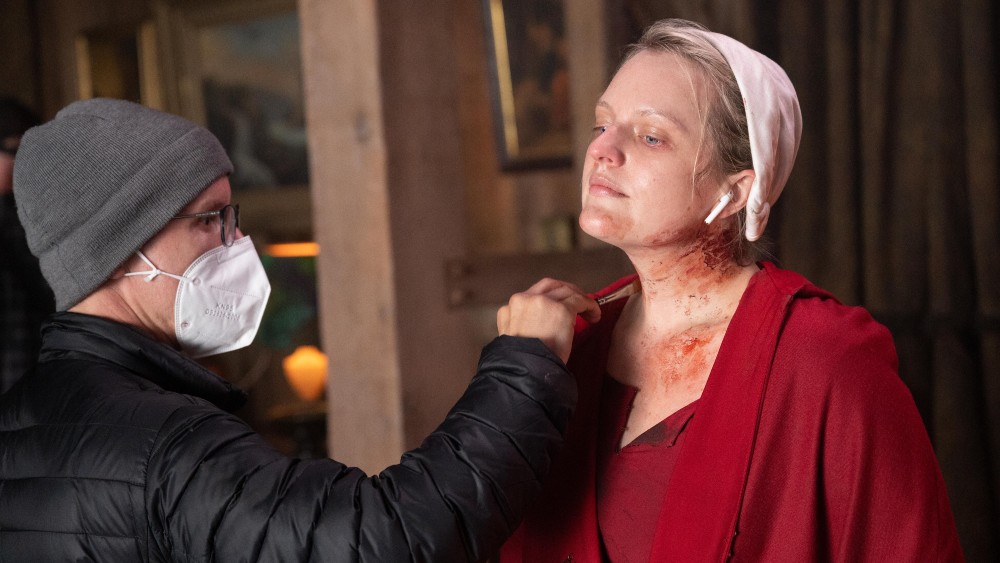
BTL: What did you see as your mission statement on The Handmaid’s Tale, and how has that mission statement evolved over the course of the show’s run?
LeBlanc: My goal was to get each and every character exactly right, with the right makeup in place, in particular for those intense closeups. The makeup is supposed to enhance, but not distract, and a lot of the looks aren’t meant to look like makeup at all. I felt a great deal of responsibility to Margaret Atwood’s book. I knew that each character had to be exactly right since the audience needed to feel completely emotionally connected. I always have the viewers in mind when creating each makeup look.
BTL: Something that’s fascinating to me about much of The Handmaid’s Tale’s makeup is that it must almost seem counterintuitive, in that you’re using makeup to visually present many characters at their rawest, devoid of makeup, yet it’s needed to create, say, puffiness or injuries, or to show stress and aging. How much thought have you given that element of what you do?
LeBlanc: Yes, sometimes it’s tricky, because the actors have such great skin or look so well-rested and that has to be undone! I do what feels right for each character without trying to overthink it, which can be difficult at times, but each character’s emotions and present situations definitely play a role. I do what’s needed and end up usually making any final adjustments on set. It’s always better to add a little more makeup than start with too much. So, if I’m unsure about the set lighting, let’s say, I will wait and add if need be when the performer is in their proper set lighting.
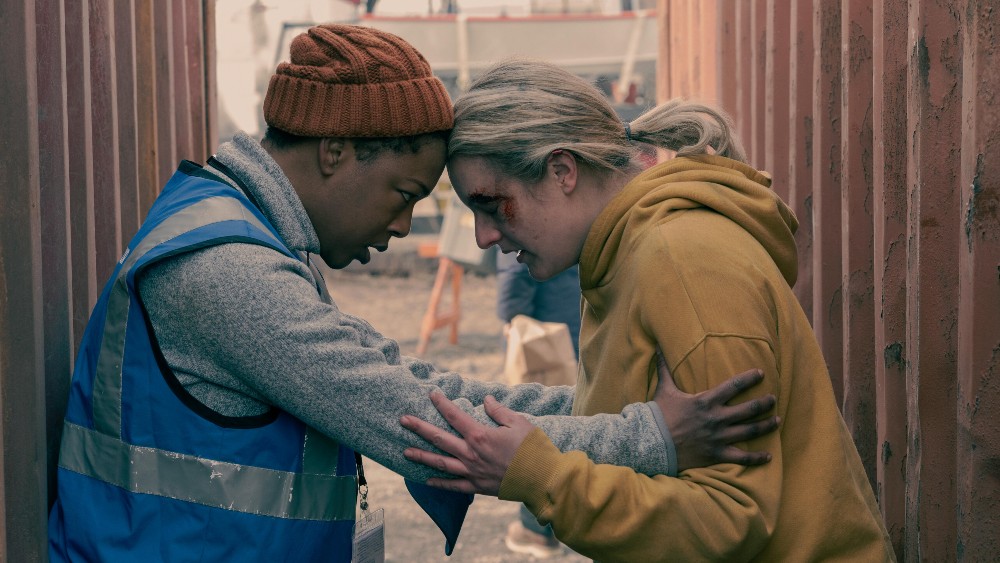
BTL: Speaking of stress, the directors of The Handmaid’s Tale love their closeups. How much pressure does that, coupled with clarity today’s hi-def TV’s deliver, put on you and your team?
LeBlanc: The closeups add another huge element of stress, because you do see every single detail! I’ve learned to be better at it, but it took probably the first two seasons before getting used to it. They add a lot of pressure to myself and my team, absolutely. I don’t really relax from the start of the day of filming. It’s important to be meticulous about the looks that show up on screen, so I’m watching the monitors throughout the entire day and making any adjustments as the scenes and lighting change.
BTL: No one is the focus of more extreme closeups than Elisabeth Moss. She’s not just the star, and has to be fearless in terms of how she lets herself look on screen, but also a very involved producer and occasional director. She also brought you on board for The Invisible Man. How would you describe your relationship with her and the shorthand that you two have developed?
LeBlanc: Let me first say that Lizzie is an incredible human and is fearless in everything she does. She knows that I’m there for her and am watching her closely on set at all times. I always want to get the makeups right and ultimately am a perfectionist. So, there is trust there. We have a great relationship, love what we do, and are there to do amazing work, but at the same time keep it light between scenes. I love working with Lizzie. I’d do any project with her.
BTL: Real fast, please give me a couple of sentences about the challenges of the makeups for… Aunt Lydia…
LeBlanc: Keeping her real and ruthless. Her makeup is probably the rawest of the characters with layers of pale cooler tones.
Serena Joy…
LeBlanc: A clean, simple, beautiful makeup with a strong brow. Her makeup within Gilead needed to keep her within the confines of a certain class and a Commander’s wife.
Commander Waterford…
LeBlanc: Using Joe’s [Fiennes] beard was the biggest makeup choice I made for his character, expressing stress and aging through the grooming and colors. Getting that right for each season and his story arc was extremely important.
Commander Lawrence…
LeBlanc: Keeping his makeup simple and somewhat warm to show his softer side. I also kept his facial hair well-kempt and more controlled, to reflect his powerful, authoritative position.
BTL: The scenes in the show in which the handmaids interact with any women who are not handmaids are pretty powerful, even just given the visual contrast in makeup and costumes. How do you approach those scenes in order to heighten that contrast?
LeBlanc: I approach those and any scenes with a feeling or emotion that I get when I read the script. I always feel a sense of obligation if I can help to make the scene more powerful and the characters more real. It’s all about the backstory, which I’m always thinking about. Which women have access to what products? What’s available in Gilead? Without going overboard, I think the contrasts speak for themselves. There are subtleties of things like an extra, out-of-line eyebrow hair here and there for handmaids, because they can’t have tweezers, which are sharp and can be used as weapons. The handmaids don’t get as much sun because their faces are constantly covered, and they hardly get to go out.
BTL: How did the pandemic and all the testing and social distancing change the game for you and your team while shooting season four of the show?
LeBlanc: It was extremely challenging! We had started the season and had to shut down for several months once the pandemic hit. I felt it helped that we all knew each other and we were all going through the same challenges. Masks were, of course, affecting the makeups and also face shields were visually a hindrance. But we all came through and supported each other in a very difficult time, and I think the work turned out wonderfully. I’m very proud of our whole production.
BTL: Tell me a bit about your team. How big is it? Who can’t you do your job without?
LeBlanc: Having a strong support team is essential since you’re only as strong as your team. I can’t do my job without my key, Alastair Muir, who basically is my right hand. When we need more complicated prosthetics, or have crowds and other scenes where we don’t have time to do every single character ourselves, the other makeup artists on our team are essential. Every character needs to look correct in this environment, so we really trust our department to carry out our artistic vision we have for the show. Paul Elliot, the hair department head, is wonderful to collaborate with to get the character looks just right. We all support each other on and off set.
BTL: And, be honest, are the phrases “Praise be” and “Blessed be the fruit” uttered every day on set and in the makeup trailer, or are they totally banned?
LeBlanc: The crew really loves those phrases as long as they’re not overused (laughs). I wouldn’t say every day, but we definitely use them and get a kick out of them.
The Handmaid’s Tale is available to watch on Hulu. All photos courtesy Hulu, except where noted. (Click on images for larger versions.)

